Pedigree expert Sid Fernando has a deep memory and a willingness to publicly recall past, less-than-wonderful, episodes in recent racing history, qualities that make him a good source for adding context to current, less-than-wonderful, episodes in racing. Late last night, Fernando was bringing some perspective to the questions about Barbara Livingston’s 2017 Eclipse award for a multimedia piece that reused copy from a 2010 blog post by referring to the controversy over Eclipse media award rules after author Laura Hillenbrand won a 2001 Eclipse award for an excerpt from her book “Seabiscuit” that was published in Equus magazine.
In a Twitter thread, Fernando pointed out that, “Ray Paulick resigned from NTWA after 2001 awards after Jay Privman questioned Laura Hillenbrand’s entry,” with a screenshot from Paulick’s site including these paragraphs:
I quit the National Turf Writers Association after the 2001 media Eclipse Awards were announced and then-NTWA president Jay Privman of the Daily Racing Form unfairly, in my opinion, questioned the eligibility of a piece written by one of the winners, Laura Hillenbrand. Hillenbrand, author of the best-selling book “Seabiscuit: An American Legend,†had previously won an Eclipse Award in 1998 for an article on Seabiscuit published in American Heritage magazine. Her 2001 award was for an original adaptation from the Seabiscuit book that appeared in Equus magazine.
As I recall, Privman, as NTWA president, sent an email to members criticizing the awarding of a second Eclipse to Hillenbrand and suggesting it was “unseemly†of her to even submit the piece for consideration. It was my understanding he was trying to have her stripped of the award.
Jay Privman, the National Turf Writers Association president in 2001, challenged Paulick’s recollection of the Hillenbrand discussion in the comments below Paulick’s post. It’s worth highlighting a few relevant points from Privman’s comment and the supplementary information he included from the 2002 NTWA newsletter about the issues involved:
1) First, Privman notes, “My capacity, as the then-president of the NTWA, one of the three sponsoring organizations of the Eclipse Awards, was to make sure the rules were followed, and to suggest improvements where necessary.”
The rules question was whether Hillenbrand’s entry should have been allowed, as a book excerpt that was adapted into a magazine article. The ambiguity led to Lenny Shulman’s asking — as paraphrased by Privman — about future entries:
What is to stop a book author from submitting one chapter from a book to a magazine, year after year, in an attempt to win an Eclipse Award for each chapter? Based on this precedent, it could be done.
Similarly, if Livingston’s reuse of the 2010 copy is allowed to stand, what’s to stop someone from repurposing previously published material into a “new” multimedia piece and submitting it for an Eclipse? The current rules do not address reuse. Privman said in 2001 that the loophole for book excerpts would be tightened. Will the same be done this year for incorporating previously published content into multimedia work submitted for Eclipse consideration?
2) Privman also observed at the time, re: Hillenbrand’s entry, that:
More disturbing, however, is this: the NTRA, in its press release, said the winning magazine submission was an “original adaptation†commissioned for Equus. Fine. But what it really amounts to is reconstituted matter from the book. It’s almost verbatim, yet abbreviated in some areas.
In the case of Livingston, we have an analogous situation — a significant portion of the text in the 2017 piece is verbatim copy from the 2010 post.
3) Privman also addresses a comment left by Vic Stauffer on the Paulick Report about the 2003 audio/multimedia award. Stauffer shared the Eclipse award that year with WBAL Radio in Baltimore, after he was initially awarded the Eclipse for his KSPN ESPN Radio 710 story, “56th Birthday Tribute to Laffit Pincay Jr.” Concerns were raised about factual errors in the story, leading the Eclipse Awards steering committee to reopen the category for voting.
“The organizations must be fair to all who submit awards,” wrote Privman, about how the factual issues with Stauffer’s radio story compromised other entrants in the category.
Does not the same standard apply to Livingston’s entry and this year’s audio/multimedia category? Is it fair to other entrants that the winning work was not wholly original? I say no. And while it might be unfair to single out DRF and Livingston in this year’s situation, I would argue that DRF has a greater obligation to appear to play fair because DRF is one of the Eclipse Award voting blocs and a sponsor of the Eclipse Awards program.
Jennie Rees, then the NTWA president, also commented on the Paulick Report about the 2003 audio/multimedia Eclipse award, giving some insight into the decision-making at the time about how the issue was handled:
When made aware that Mr. Stauffer’s Laffit Pincay feature had been judged No. 1 in the radio category but contained such a fundamental error, Mike [Kane] and I felt strongly that the situation mandated discussion with the other Eclipse committee members. The committee agreed that the judges deserved to be informed of the error, and let them re-vote according to their personal standards and conscience.
An even earlier Eclipse scandal yields a clue into how flawed winners have been dealt with in the past. In 1996, Stephanie Diaz won two Eclipse Awards for magazine and newspaper writing. She was then charged with fabrication and plagiarism. An investigation led to Diaz being stripped of her magazine award. Fabrication and plagiarism are much graver charges than reusing your own copy without attribution, of course (and just to be clear, I am not equating the two situations), but it’s interesting how the Eclipse organizations choose to investigate and settle the matter then — with an arbitrator. Will there be a similar public reckoning over Livingston’s award?
Posted by JC in Racing on 01/06/2018 @ 11:00 am / Tagged #2017inquiry, Daily Racing Form, Eclipse Awards, Media, Multimedia / Follow @railbird on Twitter
https://twitter.com/railbird/status/948691159311945731
It was announced on Wednesday that Daily Racing Form photographer Barbara Livingston was the winner of the 2017 Eclipse Multimedia Award for her March 24, 2017 piece, “Chasing Man o’ War’s Ghost.” Livingston has written about Man o’ War at least twice previously for DRF, and her 2017 piece opened with a striking bit of text, a note from a friend:
You told me when we were friends (age 9) that you had Man O Wars blood in you … and I believed you bc u ran really fast and could whinny like a horse.
This is the same note from a friend that begins Livingston’s 2010 post, “Man o’ War — the final portrait,” about the great horse’s last picture:
You told me when we were friends (age 9) that you had Man O Wars blood in you….and I believed you bc u ran really fast and could whinny like a horse.
The similarities did not end with that one little note.
The first paragraph of the 2017 piece is the third paragraph of the 2010 post:
For me, there is one Big Red and he was born a hundred years ago, on March 29, 1917. If others of the same nickname preceded him, they were simply opening acts. Anyone since? Call them Big Red all you want, but, to me, they are imposters.
From there, a comparison of both posts reveals that almost all of the 2010 post has been repurposed, with some rearranging, into the 2017 piece. You can view highlighted screenshots of the 2010 post and the 2017 version. Note: The 2017 screenshot is cropped to only highlight the text copied from the 2010 post, it is not the full text of the 2017 story. To view the full text of both posts on DRF, click/tap this link for 2010 and this link for 2017.
Reusing or republishing content is not unheard of in media — pieces written for one outlet may get republished in another. A publication might republish an older work made freshly relevant, or a writer may return to an older work to expand or revise it. In most instances, when this happens, the work is accompanied by a note that indicates that it was originally published elsewhere, previously published on a certain date, or that it has been revised. This is attribution, and it’s a practice that avoids the appearance of an ethical issue — deceiving your audience about the provenance of a work.
There is no such attribution on the 2017 Man o’ War piece regarding the use of 2010 copy, nor is there a link to the 2010 post, either of which would have covered DRF and Livingston against the charge of what seems to have happened here — Livingston reused her 2010 post as the basis of the 2017 multimedia piece, which has now won an Eclipse Award.
So, what’s the problem with reusing your own work, without attribution, aka self-plagiarizing? It’s lazy, for one thing. It also does your audience a disservice, passing off older work as original. And in this case, such substantial reuse may also be against the rules of the Eclipse media awards, which state that entries “must have been published or aired for the first time between November 14, 2016 and November 16, 2017.”
Alerted to the reuse, Keith Chamblin at the NTRA said on Thursday:
We have reached out for input from Daily Racing Form, which submitted the entry for Eclipse consideration, and will be discussing the situation with the Eclipse Awards Steering Committee today.
I’ll update this post when there’s a resolution to the discussion.
1/8/18: After consideration, no change.
– – – – –
Related reading:
In 2012, New Yorker writer Jonah Lehrer was caught reusing his work. The recycled text was first picked up by Jim Romenesko, launching a debate about self-plagiarism and attribution. The Columbia Journalism Review summed up the case against Lehrer like so:
The rules against all manner of journalistic recycling, from sloppy attribution, to self-plagiarism, to plagiarism, are part of the basic dos-and-don’ts of the craft. Lehrer’s many fans deserve an explanation, and hopefully they’ll get one.
Livingston’s fans also deserve an explanation.
Posted by JC in Racing on 01/05/2018 @ 12:23 pm / Tagged #2017inquiry, Daily Racing Form, Eclipse Awards, Media, Multimedia / Follow @railbird on Twitter
(Slightly edited cross-post from Twitter.)
Before the new racing year begins, I’m taking a look back at some of the moments I had at the track in 2017. First up, D’Boldest winning the Jill Jellison Memorial Stakes at Suffolk Downs. I was standing on one of the viewing stands near the finish line, aiming for a patch of late afternoon sun. It worked.
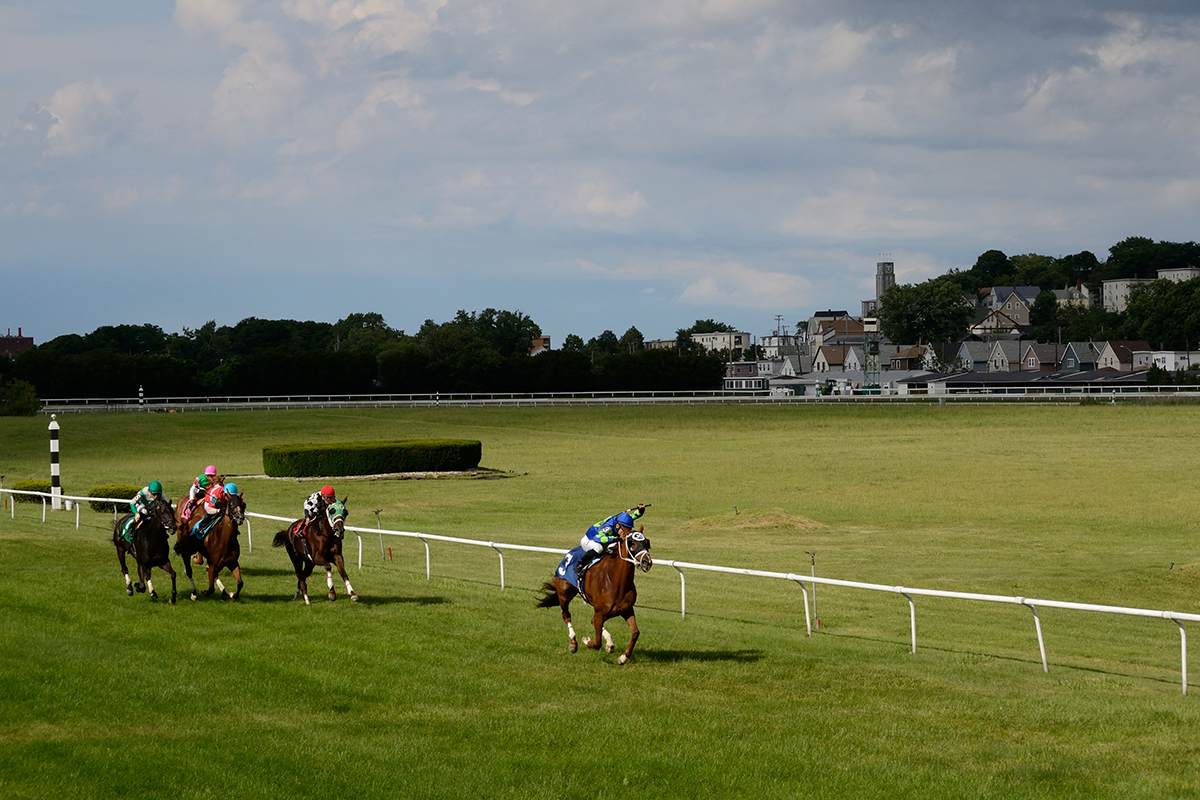
Tammi Piermarini and Dr. Blarney after winning the Rise Jim at Suffolk Downs. There aren’t that many Mass-breds these days, which makes having a good one to cheer for all the more fun.
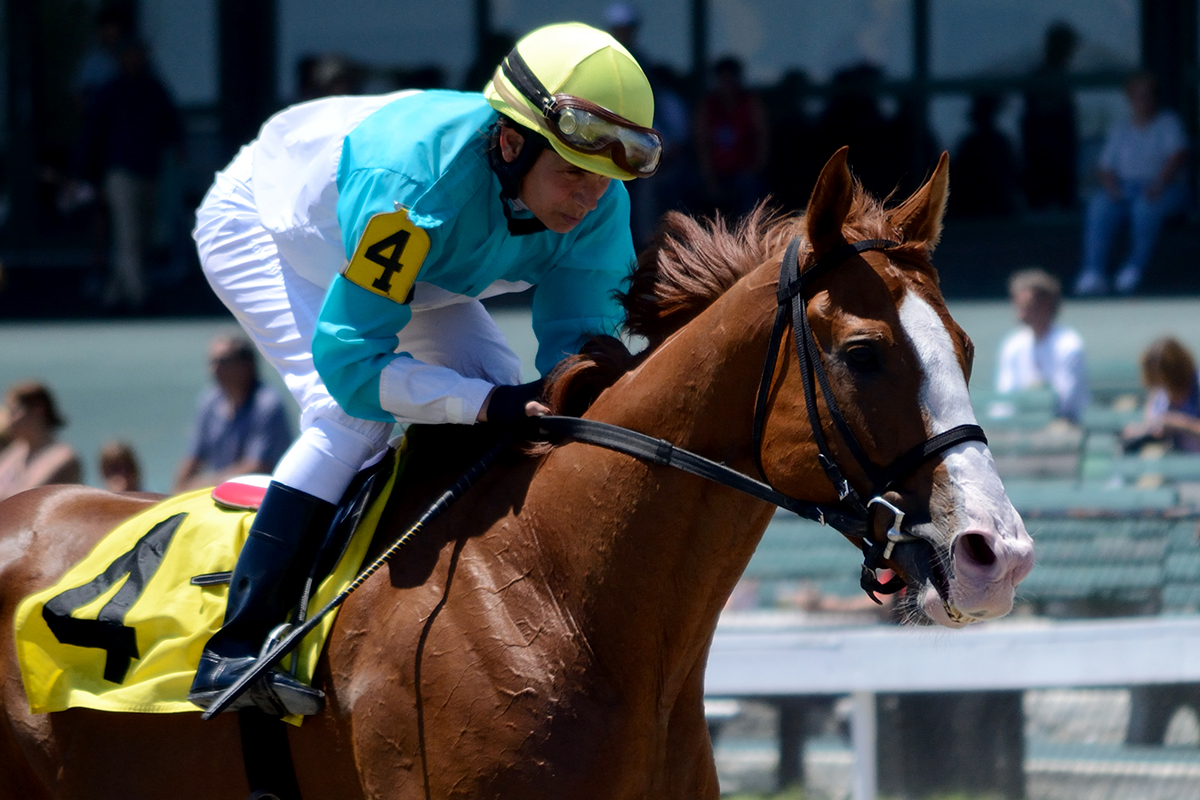
And here’s Piermarini watching the stretch run of a race in which the Suffolk Downs stewards issued a DQ. (She came out the winner.)
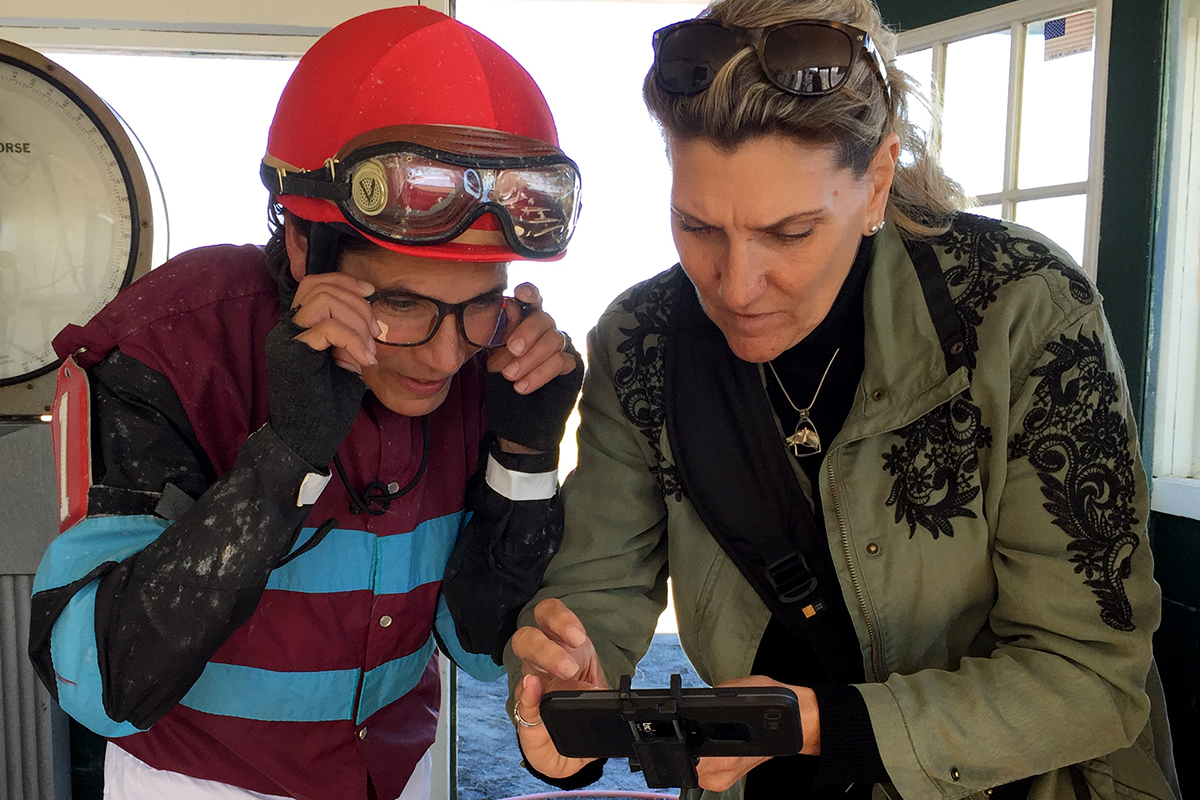
Mr. Meso is a New England champion and such a pet. He’s now several years into his second career as a pony and likes to poke his head into the scale house looking for a scratch on the nose. I took a photo of his braids one day at Suffolk Downs when he did just that.
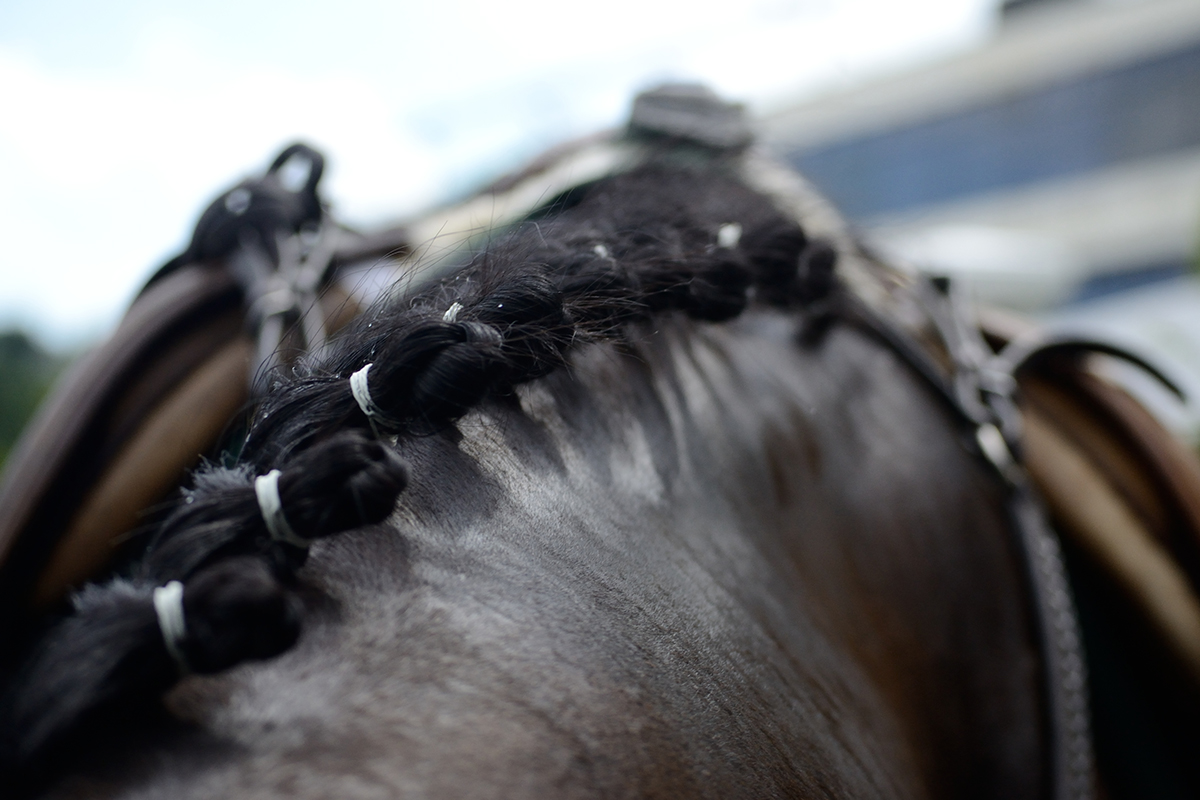
One of the pleasures of Saratoga is star spotting during training. Caught John Velazquez early in the meet exercising TAP horses on the main track.
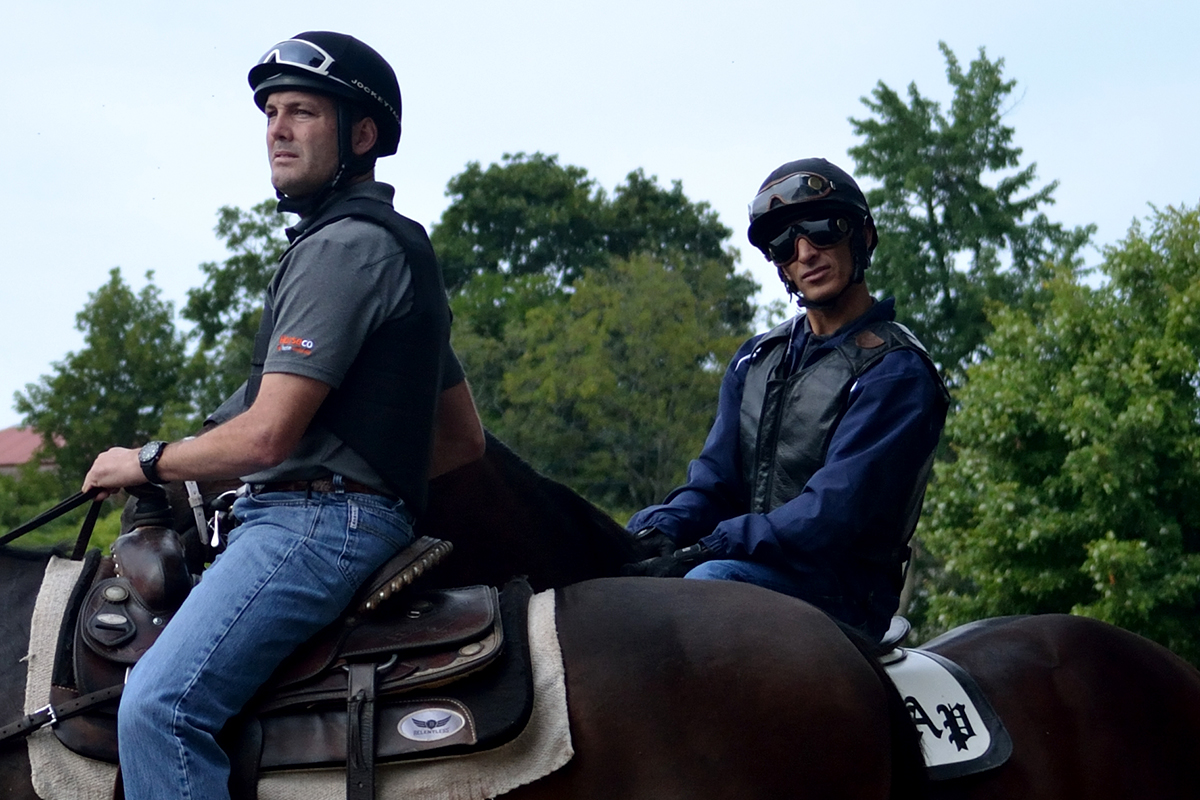
I was inspired by photographer Jamie Newell to try a Saratoga clubhouse turn photo of the Shuvee field. The picture brings that summer feeling right back.
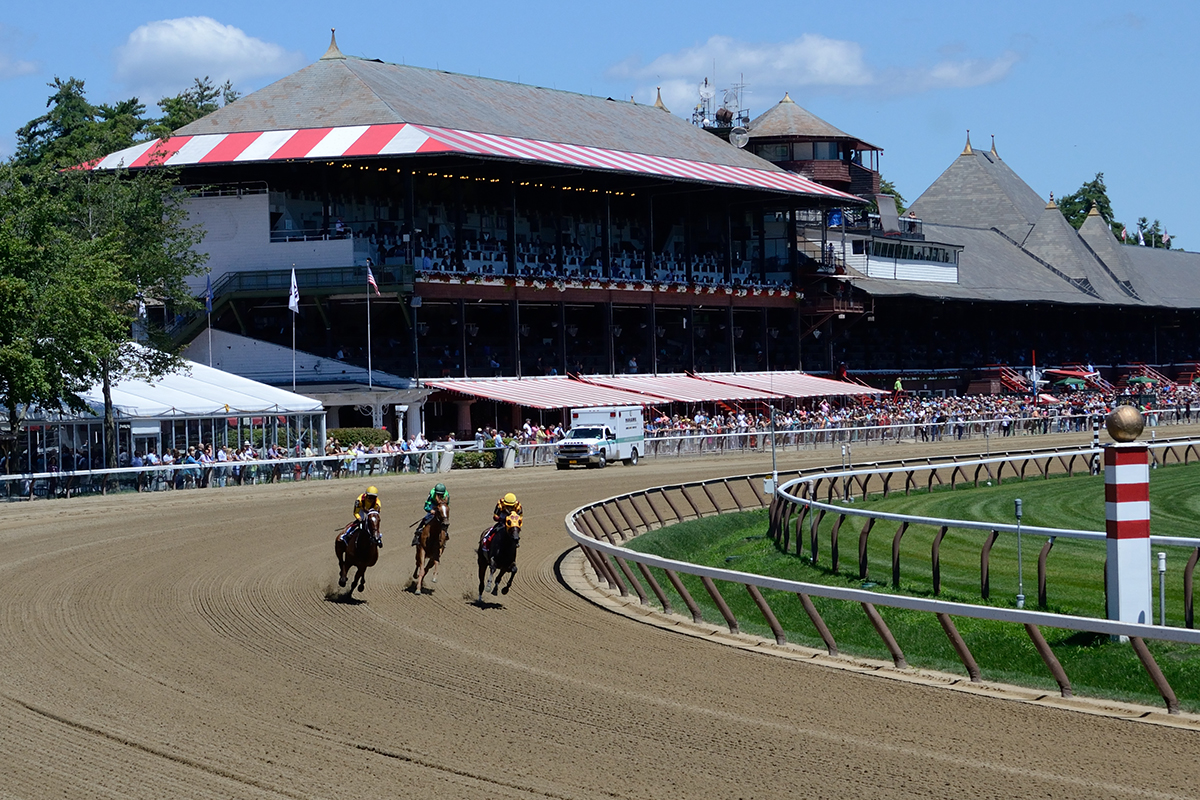
I don’t usually aim for glamour shots, but Breeders’ Cup Classic contender Collected schooling in the Del Mar paddock was so perfectly posed in the sun for just such a photo, I couldn’t resist.
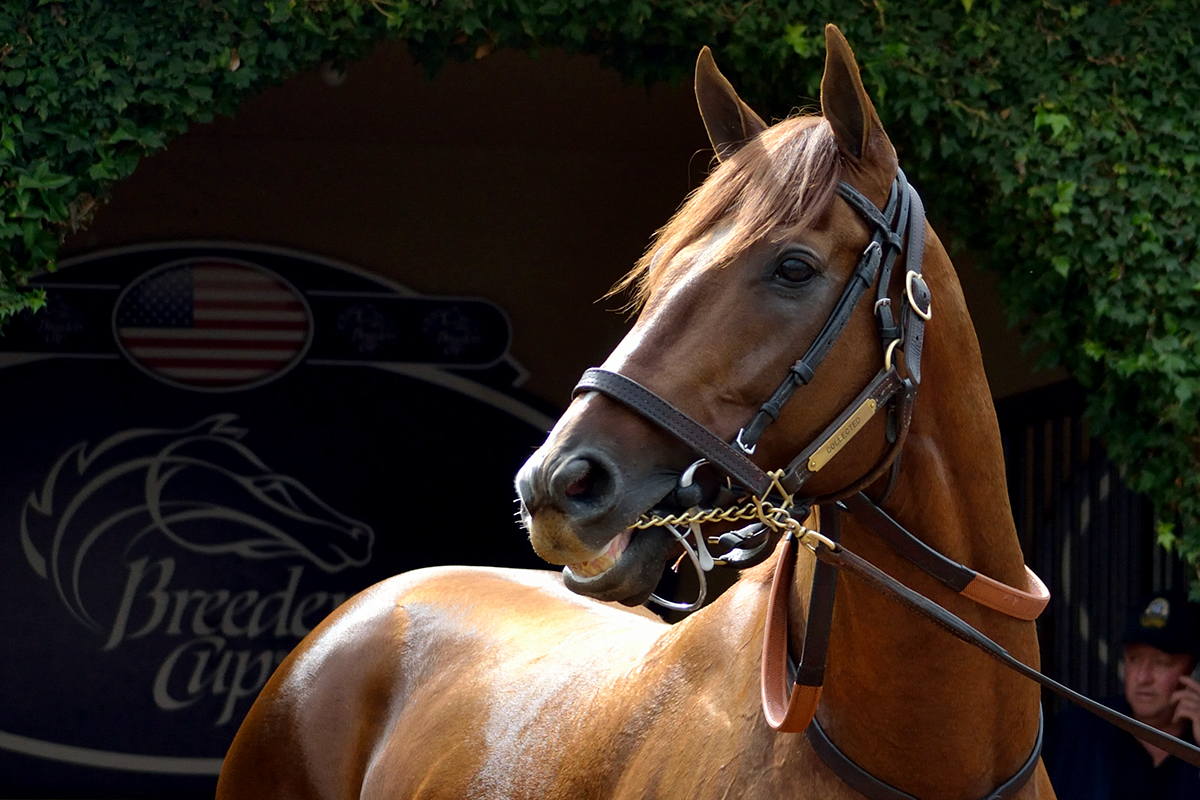
A different Breeders’ Cup schooling session, with a much scarier moment. Curlin’s Approval spooked in the Del Mar paddock. Her groom was a hero.
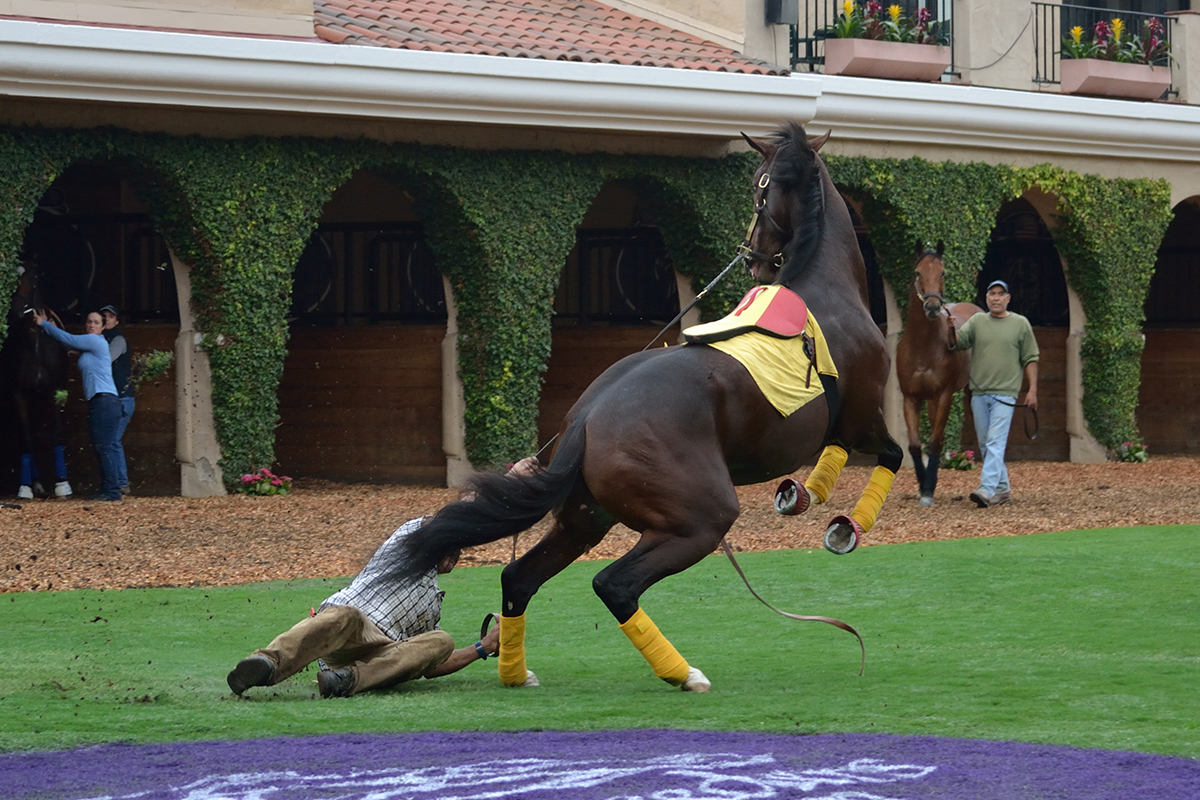
Unique Bella finished seventh as the favorite in the Breeders’ Cup Filly & Mare Sprint. She returns in the La Brea at Santa Anita on December 26. She was my Kentucky Oaks filly before she suffered a minor injury and it made my morning the first time I saw her at Del Mar during BC week.
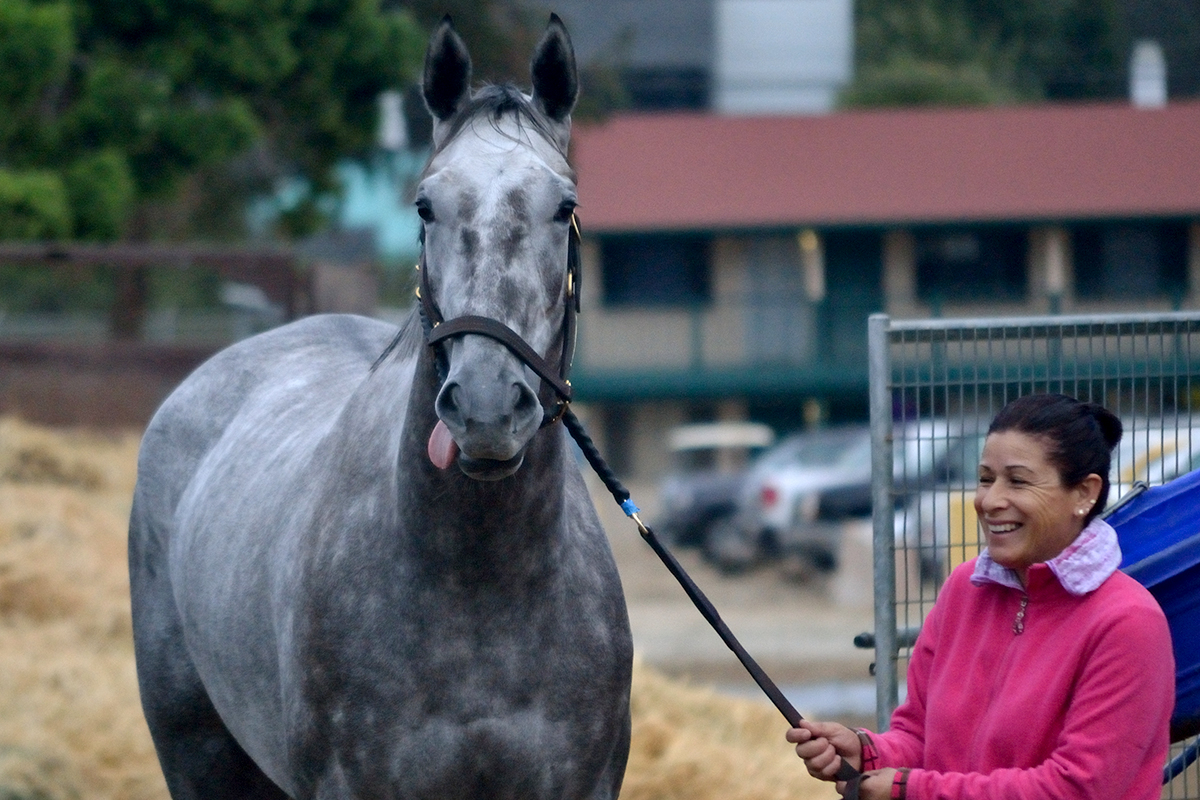
Here’s the champ — Gun Runner steps onto the track for the BC Classic.
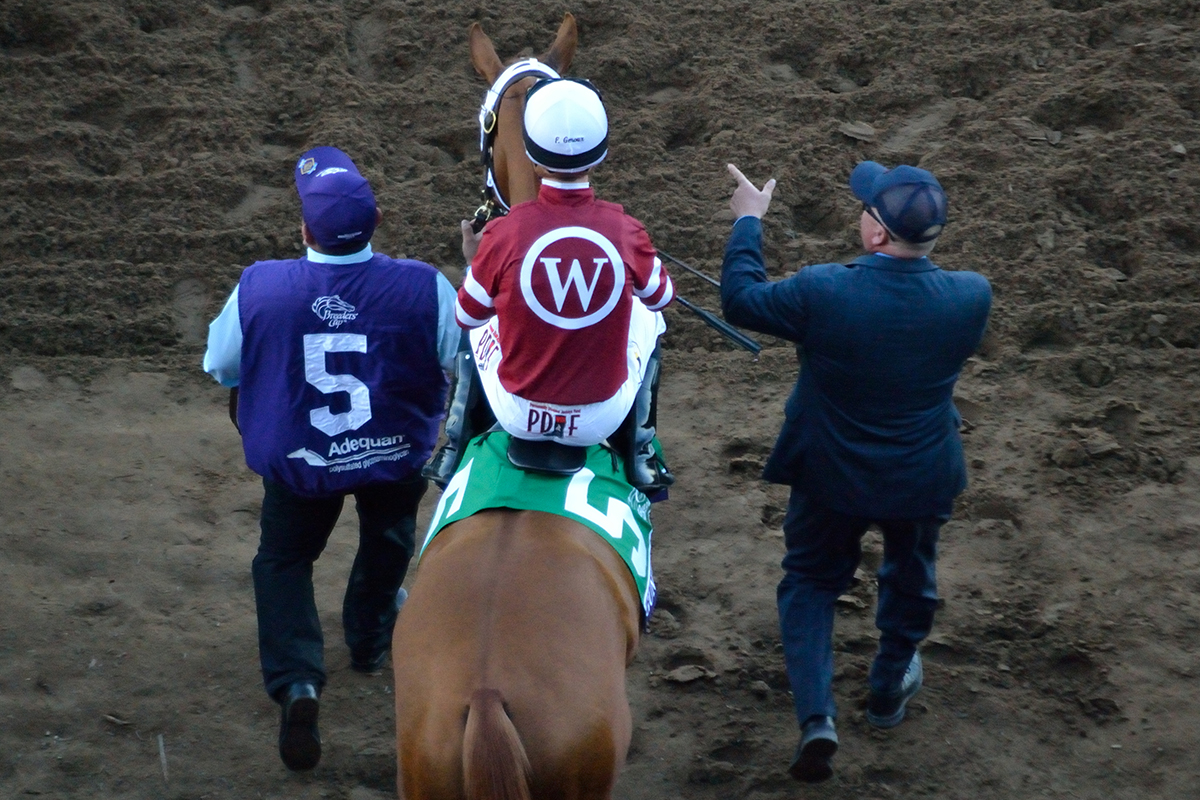
Happy holidays — see you at the track in 2018!
Posted by JC in Racing on 12/22/2017 @ 5:50 pm / Follow @railbird on Twitter
















